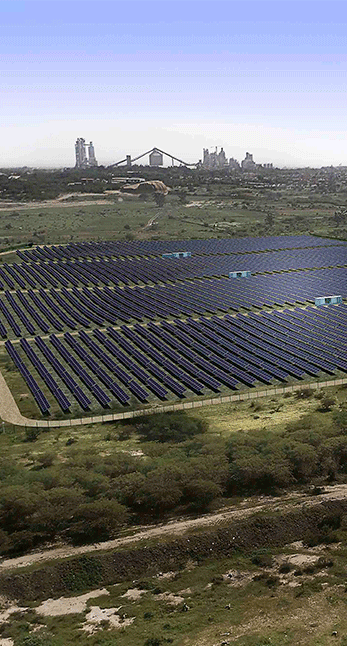Home / Our solutions / Self-Consumption
Self-Consumption
How does energy self-consumption work?
Self-consumption means consuming your own electricity production.
By installing a solar energy production source on your site, you can become your own supplier of renewable electricity! When we talk about self-consumption, two key indicators must be distinguished:
- The self-consumption rate, which corresponds to the share of photovoltaic electricity production consumed on-site instantly
- The self-production rate, which corresponds to the share of electricity consumption produced on-site by the installation.
All sites can be equipped with photovoltaic energy production sources, whether on rooftops, parking lot canopies, on the ground, or even on water, depending on the available space. Photovoltaic solar technology adapts to a wide variety of surfaces, and our teams are here to define the offer that best meets your needs. However, self-consumption does not mean that you will become entirely autonomous in your consumption. Depending on the case, you may need to draw additional energy from the grid or inject surplus production back into the grid.
What is the regulatory framework for energy self-consumption?
Self-consumption has been included since 2015 in the law on the energy transition for green growth, which provides it with an initial regulatory framework.
The APER law (Acceleration of Renewable Energy Production) of 2023 has brought significant changes to the self-consumption landscape in France, with:
- Simplification of administrative procedures: Authorization and grid connection procedures have been simplified for self-consumption installations, making projects more accessible.
- Promotion of self-consumption in new buildings: The law encourages the installation of self-consumption systems in new buildings, especially public buildings and social housing.
- Significant financial support: Financial aid mechanisms have been strengthened to support self-consumption projects, including tax credits and subsidies.
- Increased flexibility for consumers: They benefit from greater freedom in managing their renewable energy production and can now sell their electricity surplus at a more attractive price.
The benefits of self-consumption
Energy self-consumption is a solution that allows you to become an active player in the energy transition and secure both your supply and energy expenses. It thus allows you to:
REDUCE
your energy costs through better expense control and cost predictability. Indeed, by producing part of your own electricity, you become less dependent on energy price fluctuations in the market. Solar energy production costs are also relatively stable over time, enabling better budget planning.
ENHANCE
your assets: Photovoltaic installations can add value to the company’s real estate assets.
REDUCE
your carbon footprint and achieve your CSR objectives: By producing electricity from a renewable energy source, you contribute to reducing greenhouse gas emissions and combating global warming.
Self-consumption is often associated with a corporate social responsibility approach.
They trust us
Photovoltaic power plant located in Rufisque, Senegal, which directly supplies green electricity to a Sococim Industries factory, a subsidiary of the Vicat group. “This investment, an industrial first in Africa, is part of a global approach to reducing the carbon footprint of the Vicat group’s factories. An innovative approach in the fight against global warming, for which Sococim Industries entrusted Urbasolar with the construction of a solar power plant to supply the Rufisque cement plant near Dakar. We chose the Urbasolar group for its technical expertise and ability to provide an innovative plant, its environmental commitment, but also for its local involvement in the African economy. We are proud of this partnership, which marks the success of this Franco-Senegalese collaboration and works for the energy transition in West Africa and the expansion of solar electricity production on the African continent.”
Guy Sidos
Chairman and CEO of Vicat

References
Capacity :
0,5 MWp
Photovoltaic parking canopies
Committed to improving its energy performance, ULOG has chosen to install photovoltaic canopies for self-consumption that cover part of the energy needs of their logistics platform in Agen while also offering shaded parking spaces for its employees @ulogistique – Agen warehouse.
Capacity:
250 kWc 753 kWc
Photovoltaic roof
These two projects involve the installation of a self-consumption power plant on the roof of Terminal 2 (250kWp) at the Guadeloupe – Pôle Caraïbes airport, and a solar power plant (753 kWp) for storage on the cargo area. Designed to withstand cyclonic and seismic conditions, the cargo project features high-capacity energy storage to smooth out sudden variations in production due to clouds.
Our other solutions
As a true expert in photovoltaic technology, we are able to provide the solution that matches your site and your expectations.
Across the territory, our teams support you in carrying out your solar projects.
